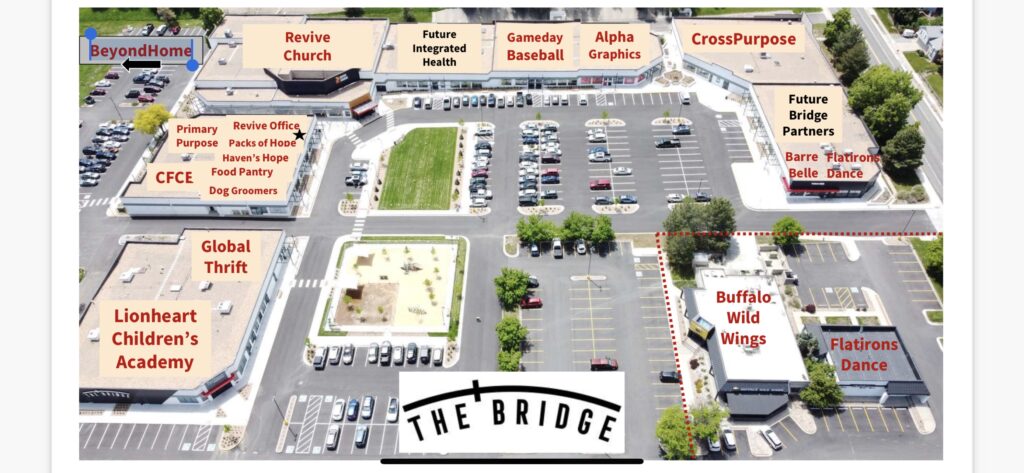
ARVADA, Colo. (BP) – Foothills Community Church changing its name to Revive Church signaled a plan within a plan.
It’s possible for a revived church to revive its community, Kyle Morris told Baptist Press. It was he who led the church to change its name in 2020, four years after he was called from the church’s youth and then its discipleship staff to be lead pastor.
“Arvada is full of challenges and opportunities,” Morris said. “As a young lead pastor, I knew we’ve got to figure out a way to do ministry in a new terrain, to go from memory to imagination. Old wineskins are bursting. We have to find a way to meet needs to open the hearts of people.

“God made it very clear to me He wanted us to have a new strategy to more effectively be a church that engages our city for the good of people and the glory of God,” Morris said. “The church is to be the driving force of change in all spheres of life.”
Through its ministry called The Bridge, Revive Church today helps Arvada with job training, child care and housing to lift people out of poverty – the three things city leaders recognize are its greatest needs – and other services, even as it guides the congregation to embrace worship, prayer, Bible study, service, giving, growing in the fruit of the Spirit, yielding to the Holy Spirit and the Great Commission.
“It’s a triple bottom line,” Morris said. “We measure ‘success’ with economic flourishing, spiritual flourishing and relationships flourishing. Spiritual is the most important, but it’s not all-important. Jesus cared for people holistically.”
Revive Church does this with a former outdoor shopping mall that it renovated. It’s a three-sided mall with all stores opening to the parking area. The church uses 33,000 square feet in what was a six-screen movie theater. A dozen or more non-profit and for-profit businesses lease the rest.
The importance of affiation
The story behind the story shows God’s handiwork.
High double-digit baptisms – 83, 85, 88 the first three years of the 1990s, and 101 in 1997 – marked the growth after Bryan Day started Foothills Baptist Church with Cooperative Program support in 1988. By 2005, after moving from a 13-year stay at a middle school to the declining shopping center’s theater, 1,077 attended Sunday morning services.
Doing so well numerically, the church, which years before had renamed itself Foothills Community Church, unofficially untied its connection with the Southern Baptist Convention. No records were kept for 16 years, until 2017, when the church reconnected with the SBC.
“Not having an affiliation was not good,” Morris said. “Being in partnership with other churches allows for greater impact and influence.
“We like a lot of what’s going on with the SBC and with Colorado Baptists,” Morris continued.
“We like what [Colorado state convention executive director] Mike Proud is doing,” the pastor added. “We like his strategy of creating partnerships, of working together.”
Getting down to business
When it was still Foothills, attendance growth and member empowerment attracted corporate and business leaders to the congregation. Soon after Wes Gardner and his family joined the church, leaders asked him to use his business background to help.
Gardner put together professionals, among whom were real estate, finance, legal and other business leaders. The group led Foothills to buy 70 percent of an aging mall.
The year 2020 was pivotal for the church. That’s when it changed its name from Foothills to Revive Church, sold a large piece of land it had bought as an investment and bought the remaining 30 percent of the mall for a well-below market price of $1.5 million. An unexpected $1.5 million check came days later from a former member, and the next Sunday church members gave $1 million and pledged $1.6 million for mall renovations. Soon after, The Bridge started with longtime member and former airline industry executive Cam Kenyon at the helm.
Kenyon led the church to not directly meet community needs being met elsewhere, but rather to partner with three key critical, overlapping services to complement what the church was already doing.
- Job Training through CrossPurpose, which provides six-month life skills, career training and transformational relationships at no cost to its clients. Participants are matched with “allies” who cheerlead their progress. The non-profit offers training in administration, construction, culinary, healthcare, IT and transportation.
- Early Childhood Education through Lionheart Children’s Academy, which provides age-appropriate instruction and nurturing for youngsters from 6 weeks to 12 years. About one-third of the students come from lower-income families
- Housing through Beyond Home, which helps families, often of young single mothers, to self-sufficiency by providing stable transitional housing, life-skills training, and support from volunteer mentors. At least eight other non-profit and for-profit firms fill out the rest of the space at The Bridge.
The arrangement is a win for everyone, Kenyon said. Affordable rental space for organizations serving lower-income residents; helpful resources and services all at one location; rental income enabling The Bridge to increase the ways it meets needs and become economically self-sustaining; and Revive members with ready access to a place to serve.
“The church is to be the driving force of change in all spheres of life,” Morris said. “By providing a hand up to people motivated to seek all forms of flourishing in their life – economic, spiritual, relationships – we can make a major impact on our city.”
Karen L. Willoughby is a national correspondent for Baptist Press
















